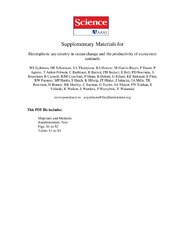Keogan, Katharine; Daunt, Francis; Wanless, Sarah; Phillips, Richard A.; Walling, Craig A.; Agnew, Philippa; Ainley, David G.; Anker-Nilssen, Tycho; Ballard, Grant; Barrett, Robert T; Barton, Kerry J.; Bech, Claus; Becker, Peter; Berglund, Per-Arvid; Bollache, Loïc; Bond, Alexander L.; Bouwhuis, Sandra; Bradley, Russell W.; Burr, Zofia; Camphuysen, Kees; Catry, Paulo; Chiaradia, Andre; Christensen-Dalsgaard, Signe; Cuthbert, Richard; Dehnhard, Nina; Descamps, Sébastien; Diamond, Tony; Divoky, George; Drummond, Hugh; Dugger, Katie M.; Dunn, Michael J.; Emmerson, Louise; Erikstad, Kjell Einar; Fort, Jérôme; Fraser, William; Genovart, Meritxell; Gilg, Olivier; González-Solís, Jacob; Granadeiro, José Pedro; Grémillet, David; Hansen, Jannik; Hanssen, Sveinn Are; Harris, Mike; Hedd, April; Hinke, Jefferson; Igual, José Manuel; Jahncke, Jaime; Jones, Ian; Kappes, Peter J.; Lang, Johannes; Langset, Magdalene; Lescroël, Amélie; Lorentsen, Svein-Håkon; Lyver, Phil O’B.; Mallory, Mark; Moe, Børge; Montevecchi, William A.; Monticelli, David; Mostello, Carolyn; Newell, Mark; Nicholson, Lisa; Nisbet, Ian; Olsson, Olof; Oro, Daniel; Pattison, Vivian; Poisbleau, Maud; Pyk, Tanya; Quintana, Flavio; Ramos, Jaime A.; Ramos, Raül; Reiertsen, Tone Kirstin; Rodríguez, Cristina; Ryan, Peter; Sanz-Aguilar, Ana; Schmidt, Niels M.; Shannon, Paula; Sittler, Benoit; Southwell, Colin; Surman, Christopher; Svagelj, Walter S.; Trivelpiece, Wayne; Warzybok, Pete; Watanuki, Yutaka; Weimerskirch, Henri; Wilson, Peter R.; Wood, Andrew G.; Philimore, Albert B.; Lewis, Sue (Journal article; Tidsskriftartikkel; Peer reviewed, 2018-04-02)
Reproductive timing in many taxa plays a key role in determining breeding productivity, and is often sensitive to climatic conditions. Current climate change may alter the timing of breeding at different rates across trophic levels, potentially resulting in temporal mismatch between the resource requirements of predators and their prey. This is of particular concern for higher-trophic-level organisms, ...


 English
English norsk
norsk
